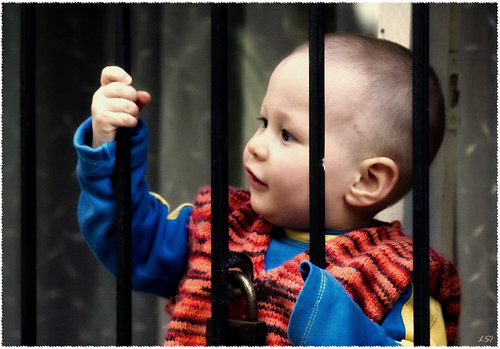Somehow This Has Become National News - Friday, August 21, 2009  Obviously sex and guns are things that tend to get a lot of attention in America, and when you combine the two in such a picture-perfect way – including, of course, the opportunity to run a gratuitous shot of a smiling blonde woman with an exposed midriff and tiny miniskirt and still calling it news – you’re likely to find a wire story with legs long enough that it’ll run in Kansas City. But this story of Midland County sheriff's deputies being fired and/or suspended without pay for handing a service weapon – an assault rifle, no less – to a waitress at a Round Rock restaurant and asking her to pose for a “Chicks Who Love Guns”-style photo was noteworthy to me for a reason that had less to do with the picture of the pretty lady in question, or even the potential public safety hazard that would be caused if it became standard operating procedure for sheriff’s deputies throughout the land to turn over their assault rifles to any woman unfortunate enough to find herself in an occupation that required her to flirt with them in order to make a living. Obviously sex and guns are things that tend to get a lot of attention in America, and when you combine the two in such a picture-perfect way – including, of course, the opportunity to run a gratuitous shot of a smiling blonde woman with an exposed midriff and tiny miniskirt and still calling it news – you’re likely to find a wire story with legs long enough that it’ll run in Kansas City. But this story of Midland County sheriff's deputies being fired and/or suspended without pay for handing a service weapon – an assault rifle, no less – to a waitress at a Round Rock restaurant and asking her to pose for a “Chicks Who Love Guns”-style photo was noteworthy to me for a reason that had less to do with the picture of the pretty lady in question, or even the potential public safety hazard that would be caused if it became standard operating procedure for sheriff’s deputies throughout the land to turn over their assault rifles to any woman unfortunate enough to find herself in an occupation that required her to flirt with them in order to make a living.
No, what I found noteworthy about this is that it’s pretty much the only time I can remember the police actually arresting each other. I’ve been reading lately about cases like Daniel Lozano, who was exonerated of attempted murder charges thanks to the work of a private investigator who proved that the officer who arrested him lied about whether Lozano fired first. Or Dewey Pressley, the Florida officer who was caught lying on camera about the cause of an accident, and whose punishment, after weeks of public outcry that followed the video becoming a YouTube sensation and national news, was a brief paid suspension. Or the case in Philadelphia, where a police officer assaulted a woman in a convenience store – again on camera – and who then sent three fellow officers in to the store in an attempt to convince the store’s proprietor to hand the tape over to them. None of the officers who tried to retrieve the tape were found to have committed any wrongdoing, and punishment for the assaulting officer was left undetermined.  And then there’s this case in Round Rock. And then there’s this case in Round Rock.
Williamson County gets a tough rap for being particularly unyielding when it comes to crime, and that’s rarely something that we celebrate. From my observations and experience, that too often translates into kids who’re busted with a joint having the book thrown at ‘em, as they used to say. But it is kind of refreshing to hear that these deputies, after requesting “some form of professional courtesy”, were instead told that it didn’t work that way, and arrested. No charges were filed, but that’s reasonable – they didn’t actually commit a crime, just a major professional and ethical (not to mention public safety) violation. The punishments ranged from a letter of reprimand for the deputy who was part of the party, but who opted to stay inside rather than go out for the pictures, to short suspensions without pay for the ones who watched as it happened, to firing for the one who gave the assault rifle over to the waitress. That seems more or less fair to me. The thing that seems to get lost in all of the thin blue line, “professional courtesy” concepts is that the people who are being policed need to trust the people charged with policing them. If we’re to accept that the police can shoot at us and fabricate a police report, or rear-end our cars and claim in a sworn affidavit that we hit them, and then face no punishment more severe than a brief paid vacation, respect for their authority diminishes. Witness this comment from the Statesman article about the PI in the Lozano case: Last time I was called for jury duty I stated clearly and unequivocally that everything cops say, whether under oath or not, are very likely to be lies. Most of the other prospective jury members nodded in agreement when I said it. It’s clearly a majority opinion among the populace now. The police have totally lost credibility in this state. It’s going to take a very long time before the police regain any sort of credibility in Texas. Now, I’ll admit that this case in particular is more or less a circus. Like I said – I don’t really care about the picture (though I do feel kinda icky about the inherent power imbalance of a group of police all joining in to convince a young woman to take a sexy photo for them) and I suspect that the woman, despite being handed an assault rifle as thou gh it were a toy, did not really represent much of a threat to public safety. (The presence of the three other deputies, who presumably had kept their weapons, probably negated any threat she may have posed if it had all been a clever ploy on her part to wreak havoc throughout the streets of Round Rock with a machine gun.) But it does help a bit to know that there are consequences – at least some of the time – for police who break the rules. If we can trust that the police are being held to a standard, it serves to restore some of the credibility they’re lacking. Circus or not, that’s a good thing. Labels: abuse of power, cameras, police violence, recording, williamson county
posted by Dan
permalink
 
Devin’s Final Word - Thursday, August 20, 2009 We said goodbye to Devin Rourke, our summer intern, today, as she gets ready to head back to Spokane for school. She did a terrific job and helped launch some projects that had been lingering for years. She also had some reflections on her experience, and about her take on the system she’s been studying. Here’s what she had to say: I’ve been a legal/social work intern at Sumpter & Gonzalez this summer and I suppose that makes me a ‘guest’ blogger. I have learned a lot during my time here: About law, about social work, and about how they can be applied to help people. I might be naïve or an idealist, but I believe that we can change the corrections system so it accomplishes what it was designed to do. The majority of those incarcerated are not convicted of violent crimes. However, 25% of those in jail for a nonviolent crime will be sentenced again, this time for a violent crime. Around 80% of prisoners in jail are repeat offenders. In California, a program was instituted that sent non-violent drug offenders to rehab instead of jail. It was significantly more successful in helping offenders battle addictions. It was also significantly cheaper. Cheaper. Now there’s the magic word. States spent an estimated $51.7 billion in 2008 on the corrections system, and it is estimated that it costs around $29,000 to incarcerate an offender for a year. To make this even more frightening, in a 15 state study by the Department of Justice in 1994, 51.8% of offenders were back in jail by the end of 3 years. How can the system be changed for the better? I think most can agree that the corrections system is not doing what it was designed to do. I think we can agree that it is costing the American people a lot of money at a time when people are counting their change. Most importantly, I think people can agree that the children of these offenders are innocent of all charges. The children of the incarcerated have often been overlooked and mistreated by the system. They have been forgotten and left behind. There are 2.4 million children in the United States with a parent in prison. 7 million kids – that’s one in ten – have a parent who’s either in jail, in prison, on probation, or on parole right now. Approximately 75% of women in jail are mothers and 6% of women entering jail are pregnant. Kids whose parent or parents are in jail are 5-6 times more likely to end up in jail themselves and one of every ten of these children is likely to be incarcerated before age 18. Studies have found that the strongest predictor of offender success post-incarceration is strong family ties. Family ties are not only important for parents, they have a huge impact on the success of a child. Multiple parental arrests and the resulting pattern of repeated parent-child separation can be devastating for children and can have severe social consequences, such as emotional withdrawal, aggression, drug and alcohol abuse, failure to perform in school, and delinquency. Many of these children never experience a stable home as they are passed from relative to relative. We have a vested interest in how these kids grow up. It makes sense economically and in the interest of justice. What kind of people would we be if we punish the children for the crimes of their parents? If we don’t make a change in their lives now, when we have a chance, then we deserve the many costs of the criminal justice system. Labels: juveniles, policy, recidivism, reoffenders
posted by Dan
permalink
 
Why you're (Probably) a Criminal - Wednesday, August 19, 2009  The recent story of a 10-year old girl ticketed for selling lemonade and cookies in the park is not only a ridiculous embarrassment for NYPD and for our criminal justice system generally, but it also underscores the alarming over-criminalization trend in our country. If 10-year old Clementine Lee can labeled a criminal for selling her lemonade in the park, then what does that mean for the rest of us? The recent story of a 10-year old girl ticketed for selling lemonade and cookies in the park is not only a ridiculous embarrassment for NYPD and for our criminal justice system generally, but it also underscores the alarming over-criminalization trend in our country. If 10-year old Clementine Lee can labeled a criminal for selling her lemonade in the park, then what does that mean for the rest of us?
This disturbing trend is highlighted in an excellent essay written by Judge Alex Koziniski and Misha Tseytlin. As they put it, "most Americans are criminals, and don't know it, or suspect that they are but believe they'll never get prosecuted." It has been reported that the Congressional Research Service cannot even county the current number of federal crimes! Why? Because, as a Heritage Foundation Report notes: According to the ABA, there are in excess of 3300 separate criminal offenses and nearly 10,000 “regulations” that have criminal sanctions. And these laws are scattered in over 50 titles of the United States Code, encompassing roughly 27,000 pages. Worse yet, the statutory code sections often incorporate, by reference, the provisions and sanctions of administrative regulations promulgated by various regulatory agencies under congressional authorization. This has become such an issue that on July 22, the House Judiciary Committee held a hearing on the Over-Criminalization of Conduct/Over-Federalization of Criminal Law. In his testimony before the committee, Hon. Richard Thornburgh rightfully raises the question: "If legal scholars and researchers and the Department of Justice itself cannot accurately count the number of federal crimes, how do we expect ordinary American citizens to be able to be aware of them?"
More than just a systemic degradation of the basic precepts of our criminal justice system, the immediate concern to everyone should be one that Krister Everston, a victim of this over-criminalization, pointed out in his testimony before the Judiciary Committee: "Ordinary citizens, even people trying to do good, are at great risk of criminal prosecution, conviction, and imprisonment." It's easy to fall back on old tropes like, "Ignorance of the law excuses no one,", and it's true, as far as those things go. But how meaningful is a principle like that when it's your ten year old being criminalized? (image via Chris_Wilson’s flickr) Labels: in the news, over-criminalization
posted by Kristin Etter
permalink
 
Criminal Defense or Poverty Law? - Tuesday, August 18, 2009  Dan mentioned a riveting piece in the New York Times during one of his recent "round-ups." The article is entitled "Is It Now a Crime to be Poor?" And the answer is yes. Absolutely yes. Dan mentioned a riveting piece in the New York Times during one of his recent "round-ups." The article is entitled "Is It Now a Crime to be Poor?" And the answer is yes. Absolutely yes.
I served as an Assistant Public Defender in Dallas County for two and a half years in the late 1990s. And it was a crime to be poor back then too. As a public defender, all of my clients were indigent and I often commented that, most days, I felt more like a poverty lawyer than a criminal defense lawyer. I defended numerous people against charges that they were Driving While License Suspended (DWLS) - people who were often forced to make a choice between putting food on the table or purchasing car insurance to clear a license suspension. I defended a mom who stole jeans from an expensive store so she could sell them to friends in order to buy medicine for her young son who was suffering with juvenile diabetes. I defended countless homeless and mentally ill people against criminal trespass charges. And I enlisted a large civil firm to challenge Dallas County's practice of jailing people on warrants issued for failure to pay fines and court costs without first holding required hearings to determine whether they could afford to pay the fines and costs. The New York Times piece mentioned the constitutional prohibition against "debtors prison." But our jails are filled with poor people who are "sitting out" costs and fines they can't otherwise pay or who are serving time on charges that stem, essentially, from their poverty. And how much sense does this make? Not only do counties fail to collect the costs and fines, but they pay to incarcerate and feed people for failure to pay the costs and fines -- people who often lose their jobs and fall deeper into poverty while they are sitting in jail. It's a lose-lose proposition. As Barbara Ehrenreich sets out in the New York times piece, the recent economic downturn is only exacerbating the criminalization of the poor: In defiance of all reason and compassion, the criminalization of poverty has actually been intensifying as the recession generates ever more poverty. So concludes a new study from the National Law Center on Homelessness and Poverty, which found that the number of ordinances against the publicly poor has been rising since 2006, along with ticketing and arrests for more “neutral” infractions like jaywalking, littering or carrying an open container of alcohol...The experience of the poor, and especially poor minorities, comes to resemble that of a rat in a cage scrambling to avoid erratically administered electric shocks.
Even in a progressive town like Austin, where I now practice at Sumpter & Gonzalez, there are ordinances galore that aim to push the homeless wherever it is they are supposed to go when they can't be "camping" in the park, or panhandling near an ATM or roadway. Thankfully, there are also good prosecutors in Austin who get it, and who will dismiss a case if we convince them that the source of the offense was not criminality, but poverty. Getting cases dismissed one at a time is better than nothing, but it's only a very small dent in a huge problem that demands systemic reform. And, let's be honest, even such reform, were it to happen, would hardly begin to address all the day-to-day obstacles faced by poor people. Indeed, it would only be one small step for the poor. But a pretty big step for humankind. Labels: barbara ehrenreich, homelessness, indigent defense, money, poverty, public defenders, what prosecutors do right
posted by Raman Gill
permalink
 
|